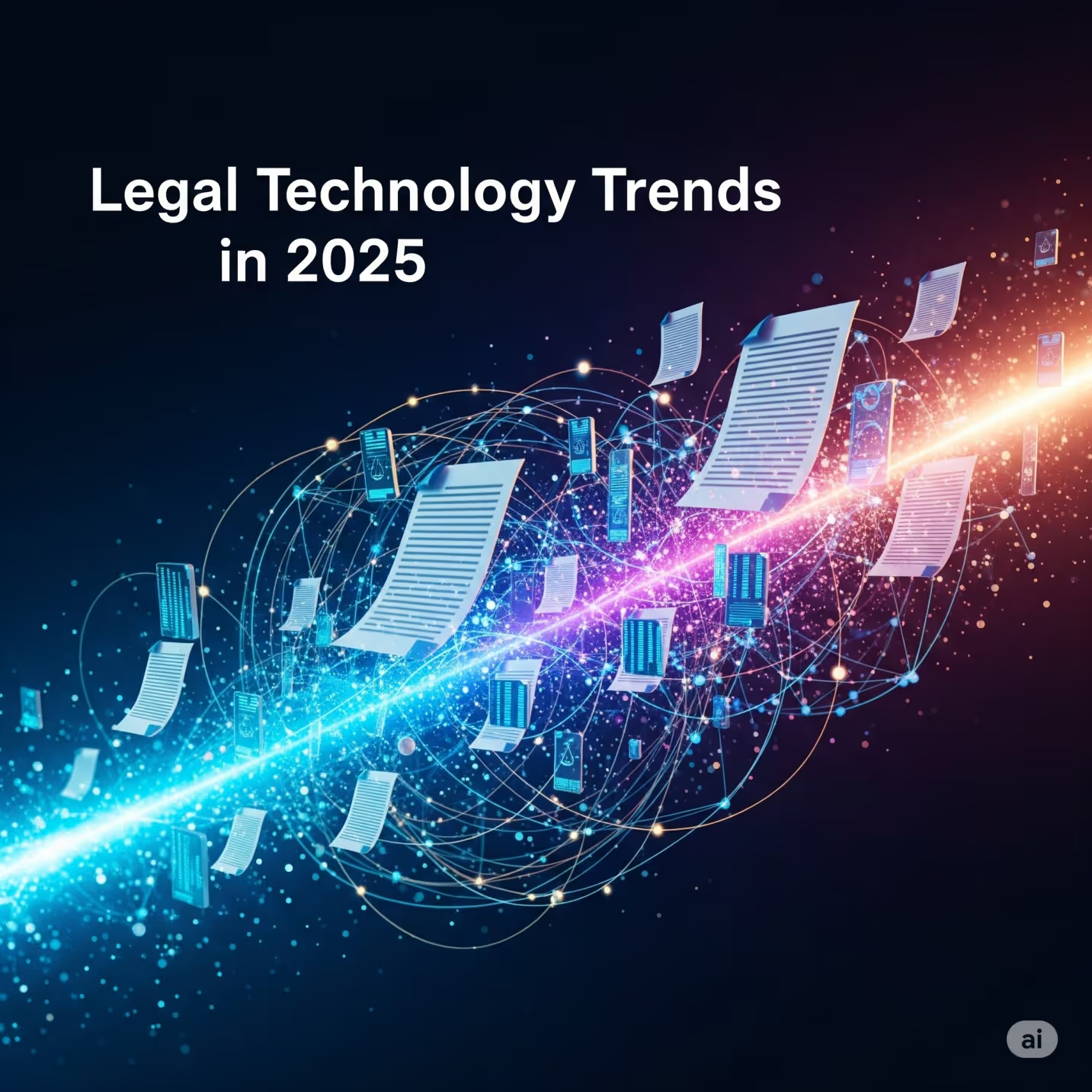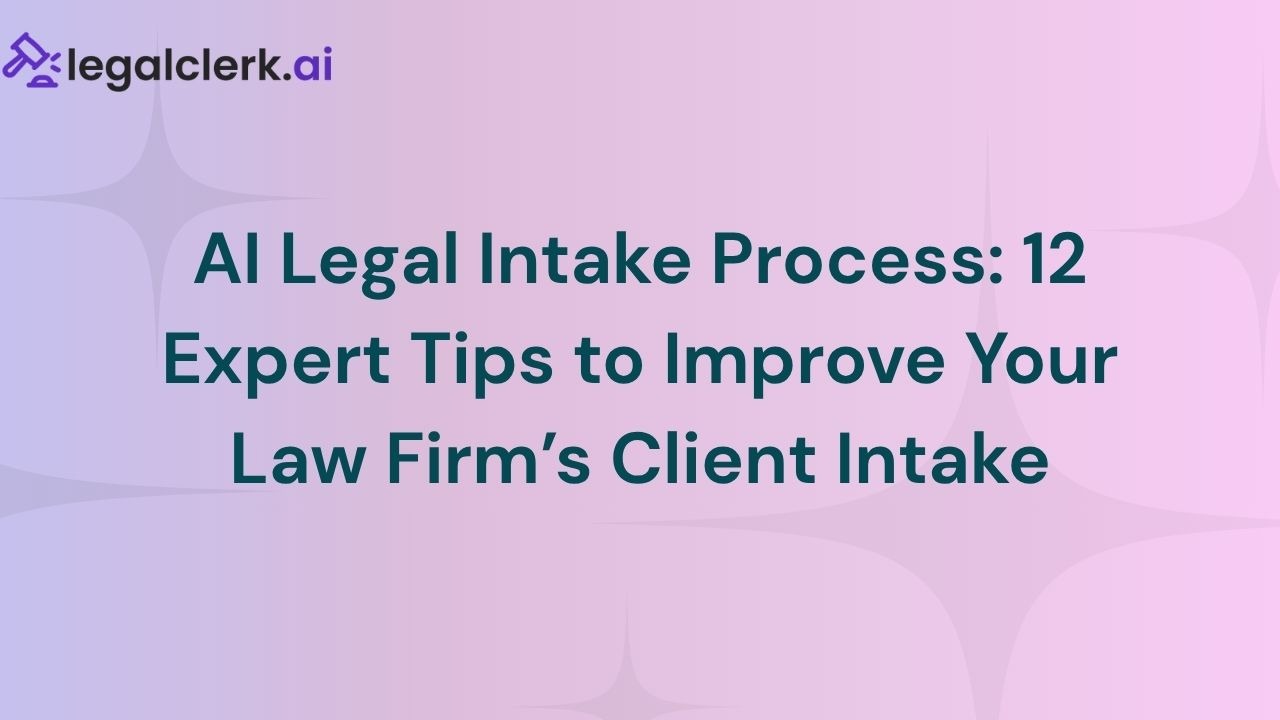7 Legal Technology Trends in 2025 Every Law Firm Should Know
In 2025, legal technology is reshaping how law firms operate, communicate, and serve clients. From AI-powered support to predictive analytics and smarter CRMs, firms are boosting efficiency and client satisfaction. These seven key trends are essential for any modern legal practice aiming to stay competitive and client-focused.

In 2025, the legal industry is not just adopting technology it’s transforming because of it. From single law practitioners to reputed national law firms, legal professionals are shifting toward systems that are faster, more accurate, and more efficient. At the peak of this transformation is artificial intelligence. AI is reshaping everything from how firms interact with clients to how internal tasks are managed.
Among the most important developments is the rise of AI-powered customer support. Law firms are beginning to understand that offering quick, helpful service is the new standard. Let's talk about the seven most important legal technology trends that are changing the legal world this year.
1. AI-Powered Legal Customer Support Takes the Lead
One of the most amazing trends in legal technology in 2025 is the adoption of AI-based client support like PowerDialer. Law firms are now using AI tools to handle a different range of routine with deep communication tasks. No matter it's responding to new client requirements or providing basic legal information or even managing scheduling requests no doubt AI tools are proving to be trustworthy and they are available in the service 24/7. These tools are also designed like a real assistant giving answers in simple language, guiding users through their legal concerns and even gathering information about their cases. This also helps reduce the time human staff spend answering different questions and it allows lawyers to focus on higher-level work.
In legal matters where clients expect responses within minutes not hours, firms that use these tools are seeing improvements in lead conversion, client retention, and overall satisfaction. AI customer support systems are also integrated with other firm software, allowing for a best client experience from the first message to the final outcome.
2. Voice AI Technology In 2025
We are seeing many chat-based support systems recently but what if I told you that voice support systems are the next big trend and they’re becoming a powerful communication channel, especially for clients who prefer speaking directly. That’s why another major trend in 2025 is the use of voice AI for legal customer interaction.
These systems answer calls, ask related questions even direct callers to the right department or individual within the company. They can confirm appointments, share office hours, and even offer basic legal information. Find more tips on answering services, These softwares are also useful after office hours like on weekends, when there is no staff member available to answer. With voice AI, law firms ensure no lead is left behind, and every call is captured, recorded, and responded in time. In many cases the system can also forward the call and send it directly to the case management software for follow-up. This efficiency not only saves money but also improves the firm's reputation for professionalism.
3. Smart Client Intake Tools Are Replacing Traditional Forms
The traditional client intake process has been one of the most frustrating parts of the legal experience, especially for new clients who are already stressed about their legal issues. Paper forms can be long, filled with legal complications which many don't understand. Many clients can be unsure about how to answer specific questions which can lead to incomplete submissions or errors that require staff to follow up manually. This slows down the process that creates more administrative work for the firm and sometimes results in clients not following up for the next steps.
In 2025 many law firms in the USA are solving this issue with smart systems that are made to simplify the entire experience. These systems use AI-powered conversational interfaces that are designed to use a natural dialogue between the client and the firm. With presenting everything at once, the system asks one simple, relevant question at a time based on the type of casemaking the process feel less like paperwork and more like a guided professional.
These intelligent tools can collect contact information, case facts, documentation, and even perform conflict checks. It works based on the client's response, the system works in real time and it can adjust follow-up questions to get the most accurate information. Completed queries are automatically sent to the relevant team member. Also it can be synced with the firm’s CRM and the process becomes easier with faster response times and less manual effort. For firms that have too much workload, especially those handling high lead volumes, these systems play a big part in both efficiency and client satisfaction.
4. Virtual Legal Assistants Are Improving Daily Operations
There was a time when people didn't trust or rely on Virtual legal assistants but now they have improved and in 2025, they will become an important part for many law firms daily operations. These AI-powered tools are far more advanced than simple scheduling bots or digital notepads. LegalClerk.ai offers a more advanced AI-powered support experience than tools like Smith.ai, especially for law firms seeking deeper automation and custom workflows. These tools perform a wide variety of administrative functions that once required full-time staff. From managing calendars and booking consultations to sending deadline reminders and summarizing lengthy case files, virtual legal assistants are playing a role in keeping operations organized.
One of their most valuable features is their ability to integrate with multiple firm systems. For example when a client submits a query through a chatbot, the virtual assistant can automatically record the query. It can also check for calendar availability, schedule a meeting, and create a case summary for the experts all without human involvement. These assistants continuously improve through machine learning and are becoming more accurate and responsive to the specific workflows of the firm.
Now you may be wondering if this automation is suitable for me? Well this level of automation is beneficial for solo attorneys or small law practices where time and resources are limited. Virtual assistants work without a break and they make sure nothing slips through the process. By handling routine and important tasks they allow legal professionals to focus more on client communication and of course cases itself
5 Legal Client Portals Are Becoming Standard Practice
Another trend that is rising in 2025 is the use of portals that give clients more control over their legal steps. These platforms allow clients to securely log in they can view their case updates they can upload necessary documents, communicate with legal staff, and even pay invoices. Worked by AI, many of these portals are interlinked and with their data driven technology they know when a client is struggling to find something and offer solutions automatically. Some systems even guide users to complete missing forms or suggest follow-up steps based on where they are in the procedure.
Another positive thing about these portals is that they are mobile-friendly. Clients can follow up with their case on their mobile devices that is of course very convenient for many users like they can use at work or from the comfort of their home. For firms, the benefits include less calls, faster response and a more organized system for managing documentation. With that the shift towards client-centered technology is just a matter of convenience.
6. Predictive Customer Support Is Emerging with AI Analytics
Firms are no longer just reacting to client questions, they're starting to conclude them. One of the developments in legal technology in 2025 is in predictive client support through data analytics and artificial intelligence to create a service experience that studies client behaviors, communications, and case timelines in order to know what a client might need before a client calls or sends an email. Picture a digital assistant who not only waits for instructions but thinks ahead two or three steps.
For instance, if a client has a pattern of calling with questions two or three weeks prior to the deadlines like a visa renewal, custody hearing the tool could learn this pattern and automatically send a timely reminder, call to action, or educate the client three weeks prior. Instead of waiting for the client to reach out to the firm, the software could send a message a helpful reminder from the system or scheduling a follow up meeting. By engaging with the client before they forget to help them track timelines for actions required of them, clients will be more informed and hopefully avoid last-minute emergencies.
Firms dealing with immigration, personal injury or estate planning matters should have an advantage with predictive support. There are timelines, steps, and documents that require client review, renewal and/or to be submitted in sequence. AI-driven predictability is like a personal assistant that alarms the client about their case and gives attention to detail.
7. Law Firm CRMs Are Becoming Smarter and More Automated
Customer relationship management software has been around for years, but in 2025, legal-specific CRM systems are entering a new era of intelligence and automation. These platforms have evolved far beyond basic contact databases. Today’s CRMs manage the entire client journey using AI to make smarter decisions and automate critical workflows.
Today's legal CRMs can help analyze lead behavior to identify which leads may be more likely to convert into prospects. They can track all your interactions with leads over email, phone, web forms and even social media. This means that it can identify all the client main points you have, when you contacted them and on which platform. The CRM will be able to find data in response times, and notifications will be generated in order to get the best lead conversion.
These systems can also help in client retention. Keeping them following up and managing all the work in their interests. These CRM also track behavior signals, such as response times, missed messages and replies on case progress. More CRMs are now integrated directly with tools, billing software, and voice/chat systems to keep everything organised.
Conclusion
The legal profession in 2025 is known for accessibility and intelligent systems that make the lives of lawyers and clients easy. When a person first visits your website and all the way until they’re signing documents, every step can now be improved and simplified through intelligent technology. The most successful firms are not just onboarding this trend, they’re leading it, with tools to improve customer support, as well as communication and relationships. AI is not about making the human side of law go away. It is about making lawyers more available and efficient and able to focus on the work that truly counts. Regardless if you are part of a growing practice or a small firm with a few employees, these 7 legal technology trends in 2025 provide a path for you to lead.
Recent Blogs
FAQs: Everything You’re Wondering About Your AI Receptionist
Absolutely. Whether you need a full-time law firm answering service or just support during off-hours, LegalClerk adjusts to your needs. You control when the AI receptionist picks up.
Yes. LegalClerk is built specifically for law firms. It knows how to handle legal intake questions, understands terminology by practice area, and never misses a required field or form detail.
Yes. Our AI legal receptionist uses advanced natural language processing and human-like voice tech to deliver a warm, responsive client experience. Most callers can’t tell it is AI — and that’s by design.
Yes. LegalClerk connects with tools like Clio, Lawmatics, Google Calendar, Calendly, and more. New leads, appointments, and intake summaries are automatically synced.
Yes. LegalClerk offers multilingual legal receptionist support, allowing you to serve a broader range of clients with accurate, translated intake flows.
Completely. LegalClerk uses HIPAA-grade encryption, secure storage, and detailed access logging. Every call and submission is protected and fully auditable.

.avif)
3.jpg)


.jpg)